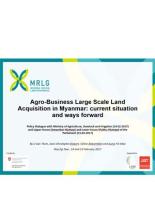Land Library
Bem-vindo à Biblioteca do Land Portal. Explore nossa vasta coleção de recursos de acesso aberto (mais de 74.000), incluindo relatórios, artigos de revistas científicas, trabalhos de pesquisa, publicações revisadas por pares, documentos jurídicos, vídeos e muito mais.
/ library resources
Showing items 10 through 18 of 348.This presentation summarizes an on-going research in Myanmar, carried out by renowned agricultural specialist U San Thein and a team of experts, with the support of MRLG.
FAO published its Voluntary Guidelines on the Responsible Governance of Tenure (VGGT) of Land, Fisheries and Forests in the Context of National Food Security in 2012.
FAO published its Voluntary Guidelines on the Responsible Governance of Tenure (VGGT) of Land, Fisheries and Forests in the Context of National Food Security in 2012.
This video is part of one of the major activities of the L&A initiative “Collective Learning on Land Conflict Resolution” in Cambodia. It shows how successfully the participatory resolution of land conflict by the villagers in Sre Chhuk village in Lumphat district has been managed.
This video is part of one of the major activities of the L&A initiative “Collective Learning on Land Conflict Resolution” in Cambodia. It shows how important the solidarity of villagers is important to prevent land grabbing.
As the Ministry of Agriculture, Forestry, Fisheries (MAFF) aimed to finalize in the end of 2016 the draft law on agricultural lands that is currently in 6th draft, MRLG, together with other partners, has supported the NGO Forum on Cambodia to mobilize representatives of farmer organizations and C
The « Environment and Natural Resources Code of Cambodia » (Sixth Draft – – 20 November 2016) is a very extensive proposed law (535 pages !) which will have, if adopted, major impacts on many aspects of Cambodian development (Mines, Energy, Urban planning, etc..) but is particularly important for
This short video examines an initiative by Earth Systems to develop a tea sector dialogue platform that brings together key stakeholders in the value chain to jointly examine challenges and opportunities for the development of a more equitable and sustainable tea sector in Laos.
This short thematic study challenges the assumption that the legal framework to recognize and protect indigenous peoples’ (IP) customary lands is adequate and that the challenge lies in its implementation.









